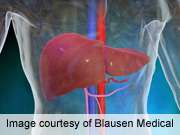(HealthDay)—Measurement of α-fetoprotein (AFP) detects hepatocellular carcinoma (HCC) most accurately in patients without hepatitis C virus (HCV) infection, according to a study published in the May issue of Clinical Gastroenterology and Hepatology.
Purva Gopal, M.D., from the University of Texas Southwestern Medical Center in Dallas, and colleagues analyzed data from patients with cirrhosis (with [452 patients] or without [676 patients] HCC) from January 2005 through June 2012. Levels of AFP were calculated that would detect HCC with the highest levels of sensitivity and specificity in subgroups using receiver operator characteristic analysis.
The researchers found that levels of AFP >20 ng/mL detected HCC with 70.1 percent sensitivity and 89.8 percent specificity. Patients with HCC were identified with this AFP level with a c-statistic of 0.87, but it was significantly more accurate in HCV-negative patients than in HCV-positive patients (P = 0.007). HCC in patients with HCV-associated cirrhosis was most accurately detected with AFP levels ≥59 ng/mL, while levels of AFP ≥11 ng/mL accurately identified HCC in HCV-negative patients.
"Based on a retrospective analysis of data from patients with cirrhosis, with or without HCC, AFP level most accurately detects HCC in patients without HCV infection," the authors write.
More information:
Abstract
Full Text (subscription or payment may be required)
Journal information: Clinical Gastroenterology and Hepatology
Copyright © 2014 HealthDay. All rights reserved.




















